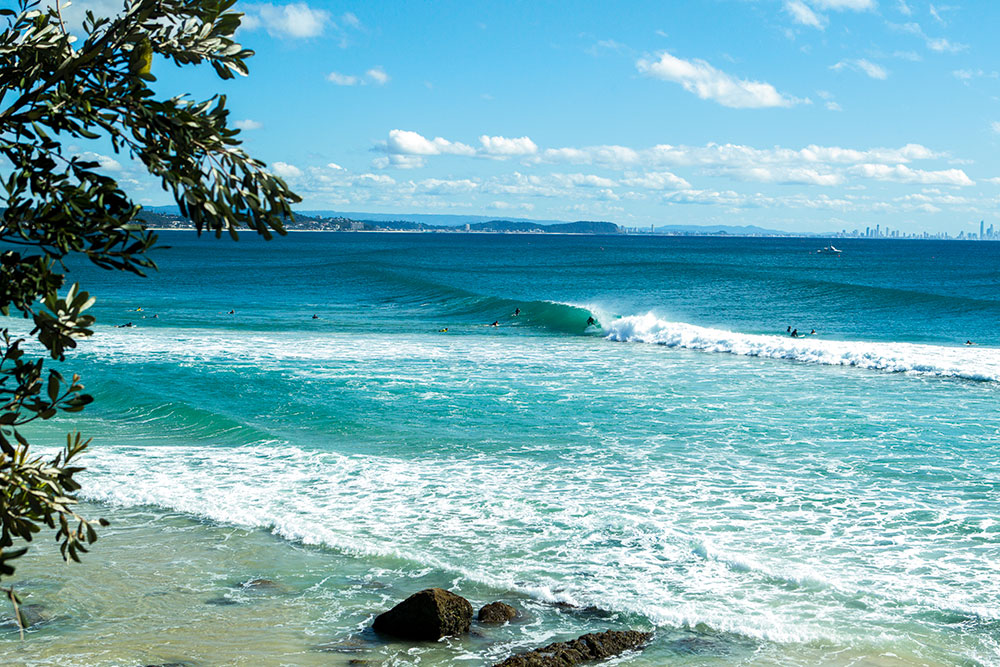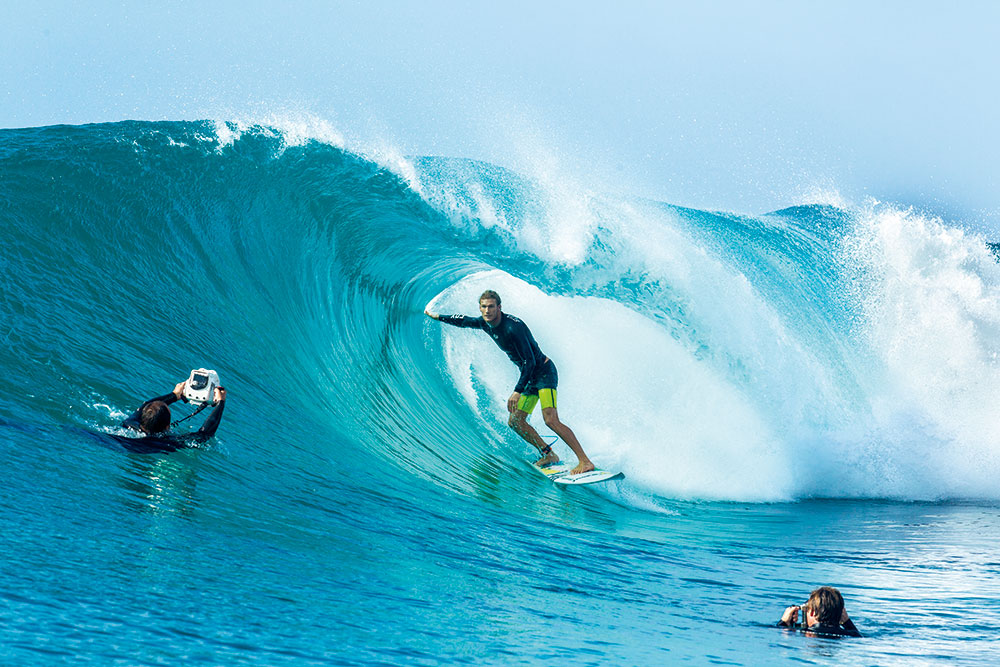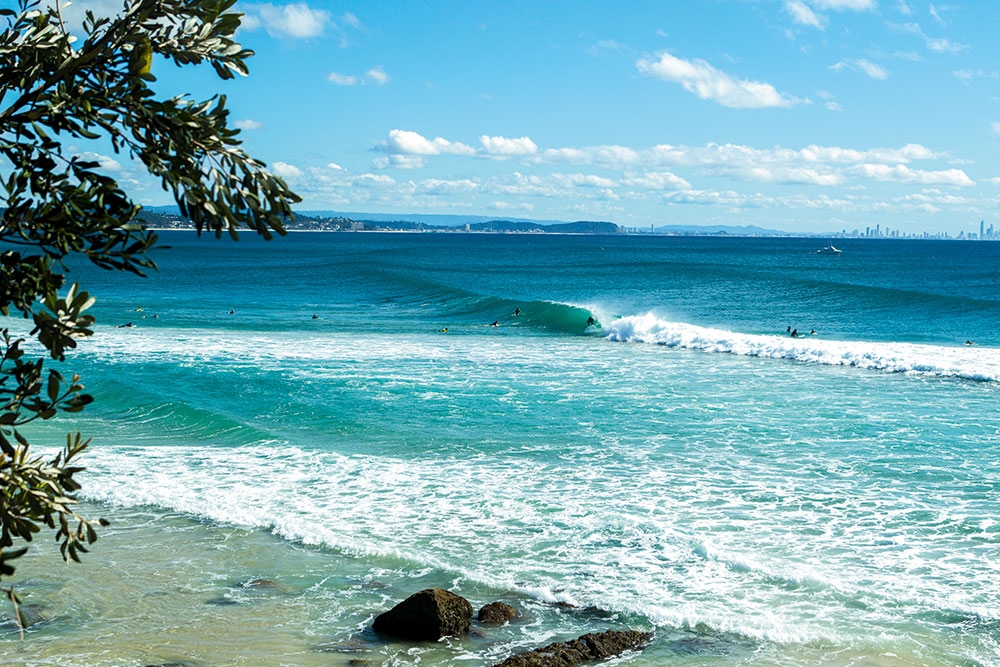Words Mimi LaMontagne
Last Tuesday we published a story called Teen Gangsters Of The Tweed. It told true stories of the Tweed Heads area’s gang and bikie violence – a violence that tore apart the community. Four years ago, those stories were harsh realities, but, is the Tweed and Coolangatta area still like that? A large majority of locals don’t think so, and vocally let us know that, and neither do police statistics.
We speak to Tony Cannon, the co-owner of local Resort Hotel and Beach Club, Komune. At five years old, Komune is one of the older and longer lasting venues in the area – he’s seen the community change, and he wants to give you the other side of the story.
 Would y’just look at it? Photo: Andrew Shield
Would y’just look at it? Photo: Andrew Shield
“A lot of people weren’t happy about what you published online,” he says, sitting on the Komune balcony, looking out at an empty wave peel through the empty Greenmount lineup. “Those stories happened four or five years ago. The whole landscape is completely different now, so it was really disappointing to read. When Sam Ford’s attack happened in 2009 it was a big blow to the whole area. It had a massive impact on people’s perceptions of Coolangatta and Tweed Heads and everyone, the whole business community and the police, got together and tried to put systems and processes in place to stop it from happening again. Stop that culture that has been a part of this area for so long. The bikies and gangs used to be the kingpins of the area – they had heaps of money, the most beautiful girls and all the drugs. They had beautiful clubhouses with bars and girls everywhere, and as a kid, you’d see that and immediately aspire to be one of them. And I mean, they were entertaining guys! They knew how to have a good time.
“A lot of surfers went down that path too. We used to see guys that were some of the best in the lineup, and all of a sudden they’d get enticed by the bikies, and they’d go down that path and end up on the wrong side of the law doing stupid shit. The bikie gangs were untouchable, and they acted like it. They seemed to operate above the law, so it created this whole ‘feeder gang’ culture, where it was really cool to get really pumped up with tats all over you, and just immerse yourself in that scene.
“But then it just stopped. The police brought in this crack squad, they call it ‘Rapid Action Patrol’, and they shut it down so quickly. It came right after the shooting in Robina Town Centre and the Broadbeach riot. And from what I know, there are no more clubhouses where the kids can hang out, so it seems there’s no more influence. Back in 2009 there were 90 violent assaults and robberies in the Coolangatta/Tweed area. Last year, it was only 38. A huge reduction.”
But, was that it? The police came in and stopped the bikie gangs, and that’s it? It doesn’t sound like that could be it…
“The other massive thing is the new liquor accord in Coolangatta. A few years ago we started a group, kind of, where all the major venues in the area meet every three months with liquor licensing representatives and police, and we work together to share information and improve safety, bounce ideas, for both our venues and in the street. The biggest thing we’ve done is bring in the ID scanner. Everyone that goes into any venues has their ID scanned, and if they play up they’re flagged, or banned, or whatever, and we all know simply by scanning their ID. It can be a six-month ban or a multiple year ban – but what we’ve found is by applying that sort of discipline consistently, people learn pretty quickly. They find themselves without social lives. It’s actually been extended now, we have to patrol 200 metres down the road, and so if they play up in the street afterwards, we give them a three-month ban.”
 Bede Durbo in the tube cell, somewhere on the Tweed Coast. Photo: Andrew Shield
Bede Durbo in the tube cell, somewhere on the Tweed Coast. Photo: Andrew Shield
But what about the people who lived that lifestyle? Who were embedded in it? Did they just leave, or what?
“Well, they haven’t been able to live or follow that lifestyle, so they’ve had to go, ‘ok, what am I going to do… am I going to keep trying to live that lifestyle and getting cracked onto by cops, or do I just be normal?’ There are so many people I know that, five years ago, weren’t going very well, but now they’re normal, good people who’ve gotten trades and go about their business. A lot of them were young, still in their late teens, and now they’re in their mid-20s – they’ve gotten jobs and found more fulfilment doing normal things. I don’t get five bikies or affiliates turning up at my door demanding entry anymore. Which is great, because it’s scary when that happens. You know you can’t let them in, but they just say, ‘let us in’, and you know you can’t fight them or anything. You kinda just lock the door and wait ‘till they go away. But I haven’t seen that in two or three years. You still get random idiots, but that’s the beauty of the ID scanners – you weed them out.”
Is it noticeable in the community? Has it changed business, real estate, etc?
“We opened five years ago, and for a long time we were the only new venue. Before we opened I wouldn’t even go into Cooly because it was just too sketchy, but we felt a little bit of change so decided to open. And now, in the past two years, there have been so many new businesses – The Strand development which includes the new Quiksilver store and bar, who collectively spent $60 million – all through Kirra, restaurants and shops like Tupe Aloha and Bread and Butter.”
We also spoke to the owner of Tupe Aloha, Rory Oberton, who told us that since the business has been open (about one year) not one violent has occured. “We know that there was a bit of trouble in Cooly and Kirra around 2010 to 2012, but all of the venues around the area know each other and let each other know if there are intoxicated people around,” Rory told us.
Dan Tokino, owner of the new Quiksilver store, said that Coolangatta has always had a lot of potential, and because of that the brand has always invested millions of dollars in the area (Quiksilver and Roxy Pros), but even moreso recently. “It’s a tourist town. It’s bringing in more families, it’s becoming a really fun place. It’s not so much of a pub scene and a rough scene like it used to be, and that’s part of what we’re doing, bringing this retail and cafe side to the families. And we’re getting fantastic trade out of it – it’s been one of our best stores since opening day, and we haven’t had any problems at all.”
“Over the last couple of years, little by little, people feel safer going out because they don’t have that threat of violence,” says Tony. “It’s not scary anymore, and it’s been really, really good to watch and be a part of the change. But it’s also been a lot of hard work to get it to where it is today. That’s why it was shattering to see that article. The problem when you have an article like that is that it grows it’s own legs – someone in Sydney picks it up and it’s regurgitated as fact.
“What we’ve been doing we haven’t really said much about. We’ve just been trying to get things done, and hopefully over time, people start feeling more and more comfortable to come here. And that’s what’s happened – it’s lost the bad image, slowly.”
Every city has a story. This is the heart of surfing in Australia, and this is its story. From here, we only see it heading onwards, upwards and beyond.



